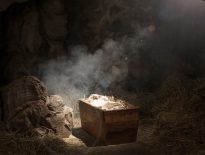Putting Christmas on the myth-busting agenda is both an uncomfortable and challenging task—gratuitous sacrilege and pure paganism for those who believe that questioning Christmas is a sign of atheistic or conspiratorial leanings; honest, necessary Christian analysis for those interested in eliminating forgeries and freeing themselves from prejudice.
Christmas myths
- “Jesus Christ was born on the 25th of December.”
- “It doesn’t matter that Christmas originated as a pagan festival because it was ‘baptised’ by the Church and adopted by Christians.”
- “Christians have always celebrated Christmas.”
- “Christmas is just a secular holiday that has nothing to do with the birth of Christ.”
- “At Christmas you are a better person.”
The 25th of December has changed history, it has created emotions, and it has changed lives. With the birth of Isaac Newton (25 December 1642), the world would think differently. With the death of Charlie Chaplin (25 December 1977), the world would laugh less. With the execution of the Ceaușescu family on 25 December 1989, Romanians escaped the nightmare of dictatorship. In 1991, Mikhail Gorbachev chose Christmas Day to break the Iron Curtain by resigning as president of the USSR. Years later, the events remain mere calendar dates, devoid of emotion for the generations who did not experience them.
The birth of Jesus: the good and the bad
Two thousand years on, the birth of Jesus remains an emotional event, not just a historical landmark. How else can we justify the fact that at Christmas people plan to be kinder to their neighbours, and many succeed? No UN or UNICEF campaign inspires as much motivation and outpouring of love as the time associated with the birth of God’s Son. December’s altruism may come from many sources, but the Christian strand is by far the dominant one. Whether pagan, atheist or secular, people know and feel that something good comes from Christians at Christmas; the influence is simply irresistible and infectious.
At the same time, Christmas is the occasion when it is very easy to lose sight of Christ Himself. Year after year, He seems to be less and less in the forefront, replaced by tinsel, a tree, a wreath or a Lapland Santa Claus with relatively lightly dressed helpers. For some, it’s a dangerous intrusion of unbiblical traditions into biblical Christianity. For others, it’s a vulgar slander coupled with consumerism that makes Jesus Christ something to be bought and then, paradoxically, celebrated in His absence. From this point of view, Christmas is simply another holiday.
Agglomerated by myths, distorted by its translation into and out of different cultures, exploited at the price of a secular holiday, Christmas, as a celebration of the birth of Jesus, deserves a biblical evaluation.
“Today (25 December) Christ was born…”
Nowhere in the Bible is the calendar date or day of the week of the birth of Jesus recorded. His resurrection took place on Sunday, His death on Friday, and the Last Supper on Thursday evening. However, the day of His birth is unknown to us. The Catholic Encyclopaedia admits: “Concerning the date of Christ’s birth the Gospels give no help.”
The major Christian churches celebrate the birth of Jesus on 25 December, although the Catholic and Orthodox calendars have different dates for Easter, Pentecost, and Lent. Why is Easter celebrated on Sundays, regardless of the calendar day, while Christmas has a fixed date, regardless of the day of the week? It is hard to believe that we know the date of Jesus’s birth but not the date of His death. It is also difficult to prove that the calendar date is important for His birth but for His resurrection the day of the week is what is important. We are so used to this formula (Easter—Sunday and Christmas—the 25th) that we no longer question the inconsistency of the method of calculating the two days.
Clearly, some other reason for the dating of the birth of Jesus must be sought elsewhere than in Scripture.
Was anyone born on 25 December?
Historian Earle E. Cairns explains the religious context of the ancient world at the advent of Christianity. “Mithraism, an import from Persia, made a special appeal to the soldiers of the Roman Empire. It had a December festival, an evil one, a miraculously born saviour— Mithra.”[1] For the pagans, the winter solstice represented the low point in the annual evolution of the central star. But more than a mere astronomical observation, writes Alexander Hislop in The Two Babylons, 25 December, “that was observed at Rome as the day when the victorious god reappeared on earth, was held at the Natalis invicti solis, ‘the birth of the unconquered Sun”[2]. Mircea Eliade confirms that the Roman Emperor Aurelian (270-275) successfully introduced the cult of Sol Invictus. One of the measures taken was that “the birthday of Deus Sol Invictus was fixed on 25 December, the ‘day of birth’ of all the oriental solar deities.”[3]
In this mythological context, we can assume that no one was actually born on 25 December.
How did Jesus come to be celebrated on the birthday of a pagan god?
Christianity began as a Jewish sect that was later persecuted by the Romans. After centuries of proving to be an invincible force, Christianity was adopted as the state religion by Emperor Constantine the Great. His aim was to eradicate paganism from the empire. The historian Edward Gibbon notes that “the ministers of the Catholic Church imitated the profane model which they were impatient to destroy. The most respectable bishops had persuaded themselves that the ignorant rustics would more cheerfully renounce the superstitions of Paganism, if they found some resemblance, some compensation, in the bosom of Christianity.”
Mircea Eliade notes the manifest tendency of the Church in the first centuries to “assimilate and revalue symbolism and mythological scenarios of biblical, Oriental or pagan origin.”[4] Association, equivalence, and superimposition followed. A vivid example is given by St Cyprian the Carthaginian: “O! The splendid and divine Providence of the Lord, that on that day, even at the very day, on which the Sun was made, Christ should be born” (De Pascha Computus, XIX).
There were, however, Church Fathers who condemned the mixture. Tertullian said bluntly that the Sun was not the God of Christians, and Augustine denounced as heretical the identification of Christ with the Sun. St John Chrysostom, however, confirms the paradigm suggested by Eliade: “Our Lord, too, is born in the month of December… But they call it the ‘Birthday of the Unconquered.’ Who indeed is so unconquered as Our Lord? Or, if they say that it is the birthday of the Sun, [we may say] He is the Sun of Justice.”
“The general opinion of liturgists and historians from Apuseni is that the day of the birth of the god Mithras was thus replaced by the day of the birth of the Saviour,” writes Prof. Ene Braniște on an important Romanian Orthodox website.
The Catholic Encyclopaedia also concludes: “The well-known solar feast, however, of Natalis Invicti, celebrated on 25 December, has a strong claim on the responsibility for our December date.”
While in past centuries various Christian denominations denounced the feast as a Catholic or even pagan institution, the Church of the early centuries did not recognise it, and the Apostolic Church does not mention it at all.
The Bible says nothing about the anniversary of Jesus’s birth, although it is clear that Scripture considers it to be an important event.[5] The early Church did not associate the birth of the Saviour with any feast. There were only two feasts in the Church: the Sabbath and the Last Supper. The first was instituted by God at creation and confirmed in the Ten Commandments; the second was instituted by Jesus, who told his disciples, “do this in remembrance of me” (Luke 22:19). The practice was confirmed by the Apostle Paul, who wrote to Christians: “For whenever you eat this bread and drink this cup, you proclaim the Lord’s death until He comes” (1 Corinthians 11:26).
The Catholic Encyclopedia admits that “Christmas was not among the earliest festivals of the Church. Irenaeus and Tertullian omit it from their lists of feasts; Origen, glancing perhaps at the discreditable imperial Natalitia, asserts that in the Scriptures sinners alone,[6] not saints, celebrate their birthday; Arnobius can still ridicule the ‘birthdays’ of the gods.”[7]
Christmas officially entered the Church in the fourth century, as Cairns notes: “Not until about 350 was Christmas adopted as a Christian festival.”[8]
Christianity and paganism in the celebration of Christmas
What criteria do we use to determine whether a holiday is Christian or pagan, religious or secular: the figures celebrated, the contemporary mode of manifestation, the historical roots and traditions associated with the holiday, the manner in which it is adopted or imposed on society, or the identity or majority of those celebrating?
From the perspective of those who see Christmas as a Christian holiday, the dates are clear and non-negotiable: it is the celebration of the birth of Jesus Christ, the founder of Christianity; this is the fundamental and final point of any controversy. To those who see pagan interference, Christmas seems a kind of ancient Halloween that has gradually lost its pagan connotations and has been ‘baptised’ in the Church and in society.
The Catholic Encyclopedia claims that “even should a deliberate and legitimate ‘baptism’ of a pagan feast be seen here, no more than the transference of the date need be supposed.” Cairns also argues that it was “adopted as a Christian festival and purged of its pagan elements.”[9]
However, not everyone was so easily persuaded. Oliver Cromwell took a stand against “pagan traditions” such as carols and decorated trees. A formal act of the English Parliament in 1644 banned Christmas and condemned certain practices or products as “pagan.”[10] “I hold it to be one of the greatest absurdities under heaven to think that there is any religion in keeping Christmas-day,” argued Spurgeon. Across the ocean, Henry Ward Beecher denounced the holiday as a Roman Catholic institution, confessing, “To me Christmas is a foreign day, and it will continue to be so until I die.” By the mid-18th century in America, Puritans, Baptists, Quakers, Presbyterians, and Calvinists were expressing their aversion to the holiday, denouncing it as “pagan blasphemy.”
There is no denying the evidence in the DNA of the feast: the date of the feast is the birthday of a pagan god; the traditions and solar customs associated with the feast are part of the pagan cultures of the peoples of the world, not the Judeo-Christian tradition; and there is no biblical reference to the anniversary of the birth of Jesus.
There is no denying the contemporary mutations: the Christmas tree, globes, tinsel, Santa Claus with reindeer, sales, bargains, and consumerism; in short, a Christmas with 0% Christ. In fact, Christmas is the only holiday that has transcended the Church and has been adopted by civilisations that have nothing to do with Christianity. In the United States, 84% of non-Christians celebrate Christmas. In Japan, where Christians make up less than 1% of the population, Christmas is a general occasion for socialising and gift-giving. In many countries around the world, Christmas is the only holiday that is both religious and civil. The militant atheist P. Z. Myers once said that he celebrates Christmas and he decorates the tree because it is a secular holiday.
In short, Christmas is based on a pagan holiday that was adopted into Christianity after a questionable sanitisation. Today it’s suspected of secular mutation, bearing the name of Christ and nothing more.
The real myth to dispel
Pagan or Christian, atheist or secularised, the world appreciates the celebration of Christmas. Generally, people want to live in a better world—like on Christmas Eve—but preferably without the Christ of the Bible, if possible.
Talking about the Word becoming flesh or being conceived in a virgin’s womb is perhaps beyond the pale for many. Acceptable at Christmas, in the tones of carols, the discourse is anachronistic when we return to the crisis of “real life.” Paradoxically, as the theologian Raoul Dederen observes, “To a modernised, secularised, positivistic mentality that has lost the capacity to wonder, Christ’s preexistence, incarnation, and virgin birth seem all too often just myths that an educated mind can no longer hold.”[11]
Under these circumstances, the myths of Christmas are important, but not the end point. As relatively minor issues, they seem at best to be of interest in a dispute between novice theologians. In reality, the real central theme is the myth of the happy and good individual in the absence of God—the myth of the person who is better at Christmas because of him- or herself, who can change by his or her own strength and will. The myth of the human being who becomes free and really lives when he or she is liberated from the religion of the One who was born in Bethlehem.
In the winter of 1914, 100,000 soldiers manned the front lines in Belgium. On Christmas Eve, the German soldiers ceased firing. They began to decorate the trenches with candles and sing Christian carols. After a moment of astonishment, the British began to do the same in their trenches. Soon, in the no-man’s-land where people had been dying savagely for days, gifts were exchanged, enemies embraced, and peace was felt. The Christmas armistice has gone down in history as a unique event, a testament to the horror of war and the normality of peace. For the belligerents, whatever their country, culture or church, remembering the birth of Jesus was not a myth but a reality. For them, the myths associated with Christmas had no value at that time. Unbeknown to them, they were the true myth-busters of the world.




















